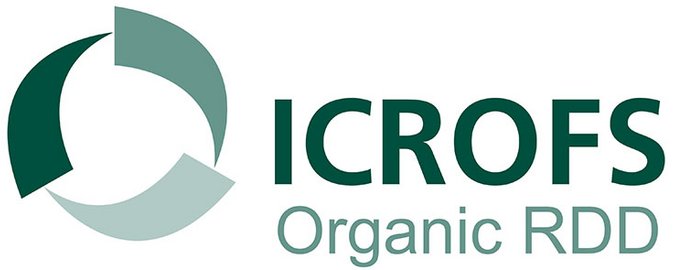Organic RDD 4
The Organic RDD 4 programme is coordinated by ICROFS (International Centre for Research in Organic Food systems). It is funded by the Green Development and Demonstration Programme under the Ministry of Environment and Food.
Organic RDD 4 is a three-year programme and runs from 2019-2021.
ClimateVeg
The Danish demand for organic fruit and vegetables is rapidly increasing and has more than doubled from 2013 to 2016. The group is now the largest organic commodity group, higher than milk, cheese and eggs together. Vegetables will in a future climate optimized diet replace meat and a proportion of 2/5 should be vegetables according to the national dietary recommendations. The overall aim of ClimateVeg is to document the climate and environmental profile of Danish organic vegetables and identify improvement options in close collaboration with Danish organic vegetable producers.
Project leader: Hanne Lakkenborg Kristensen (Aarhus University)
ClimOptic
ClimOptic will develop, document and demonstrate optimized organic fertilizers to support changes in crop rotations and manure and fertilization management for more climate efficient organic production. The project analyses a production system with individual or combinations of poultry, pig or arable farms, where biogas plants digest animal manure and crop residues to enhance utilization of nutrients and minimize greenhouse gas emissions.
Project leader: Peter Sørensen (Aarhus University)
MAFFRA II
The aim of MAFFRA II is to develop a final proof-of-concept for a natural plant-based antimicrobial feed additive that prevents post-weaning diarrhea (PWD) in piglets and thereby reduces, ultimately replaces, the use of antibiotics and zinc oxide. Based on very promising results from in vitro and preliminary in vivo trials, obtained with a specific plant cocktail (allicin-containing ramsons and acidic berries) in the recently finished MAFFRA project, MAFFRA II aims to prove that the plant feed additive concept works in organic pig production by improving intestinal health and reducing PWD incidence.
Project leader: Martin Jensen (Aarhus University)
KALVvedKO
(Cow-calf-togetherness in organic dairy production)
The fact that calves are separated from their mother 24 hrs. after birth is an obvious dilemma in organic dairy herds. It deprives both of the possibilities of interaction, learning, care, and natural behavior. It violates the ecological principles, the trustworthiness and credibility of organic farming, and society's expectations to good animal welfare, but has been accepted practice, referring to the need for milk for human consumption. The project seeks to solve the dilemma through the development of new robust and innovative stable systems for Danish conditions; systems that support a more natural life and better health through late weaning of calves (3 months).
Project leader: Mette Vaarst (Aarhus University)
ShelterFish
Trout farming and in particular organic trout farms are critically challenged by relatively high skin/gill infections caused by various pathogens, especially the parasite Costia (Ichthyobodo necator), which is ultimately lethal for fry/smaller fish. Due to new organic regulations requesting also fry to be 100% organic, this in turn compromises supply of organic fry as basic for future production of organic trout. ShelterFish will focus on solutions addressing the interactions between fish - pathogens – farming environment and water quality.
Project leader: Alfred Jokumsen (DTU Aqua)
SustainOrganic
The market (such as the public kitchens, the food service sector, canteens, public kitchens etc.) is increasingly demanding climate-friendly and sustainable food, but have no tools to optimize according to all these aspects in the meal planning. By including both the climate profile of the food and the other environmental impacts (such as biodiversity, pesticide use), which is particular relevant for organic food, the diet guidance will be able to stimulate increased organic food consumption. SustainOrganic will identify the most important organic food items in professional kitchens will cluster these in the most relevant product groups according to nutritional profile and expected environmental impact. Based on this, the project will provide guidance on environmentally friendly food choices.
Project leader: Marie Knudsen (Aarhus University)
